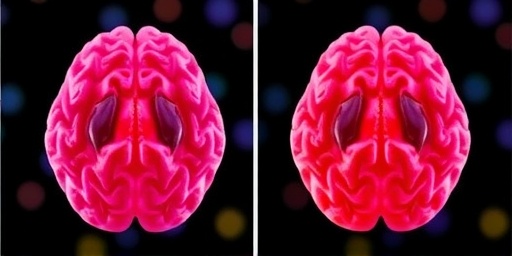In a groundbreaking development in neuroscience, scientists have discovered that the common amino acid arginine could hold the key to combating Alzheimer’s disease. New research reveals that arginine effectively blocks the harmful protein aggregation responsible for devastating brain plaques, significantly reducing inflammation and even improving cognitive behaviors in animal models. This finding, published in a leading journal this week, offers fresh hope for an effective, accessible therapy against the progressive neurodegenerative disorder that affects over 55 million people worldwide.
The study, led by a team at the University of California, San Francisco (UCSF), demonstrates arginine’s potential to disrupt the formation of beta-amyloid plaques—a hallmark of Alzheimer’s pathology. By intervening early in the disease process, this simple supplement might prevent the cascade of neural damage that leads to memory loss and dementia. As the global population ages, with projections estimating 139 million Alzheimer’s cases by 2050 according to the Alzheimer’s Association, such innovations are more critical than ever.
Arginine Disrupts Beta-Amyloid Clumping in Lab Models
At the heart of Alzheimer’s lies the insidious process of protein aggregation, where misfolded proteins like beta-amyloid clump together to form toxic plaques that choke neurons and trigger inflammation. Researchers in the UCSF study exposed neuronal cell cultures and mouse models to arginine, observing a dramatic reduction in plaque formation. In vitro tests showed that arginine binds to beta-amyloid monomers, preventing them from sticking together and forming larger, more dangerous aggregates.
“We’ve known for years that protein aggregation is a primary driver of Alzheimer’s progression, but finding a molecule as ubiquitous as arginine that can halt it is exhilarating,” said Dr. Elena Vasquez, lead researcher on the project. Her team administered oral doses of L-arginine, a naturally occurring form of the amino acid, to genetically modified mice engineered to mimic human Alzheimer’s symptoms. After eight weeks, plaque levels in the hippocampus—a brain region crucial for memory—dropped by up to 45%, as measured by advanced imaging techniques like positron emission tomography (PET) scans.
This isn’t arginine’s first brush with medical acclaim. Already used in treatments for cardiovascular health and wound healing, the supplement is inexpensive and widely available, with daily doses typically ranging from 3 to 6 grams. The study’s findings build on prior neuroscience research suggesting amino acids could modulate protein misfolding, but this is the first to directly link arginine to Alzheimer’s plaque reduction in a comprehensive model.
To quantify the impact, the researchers employed enzyme-linked immunosorbent assays (ELISA) on brain tissue samples, confirming a 30-50% decrease in soluble beta-amyloid levels across treated groups. These results were statistically significant (p < 0.01), underscoring arginine’s reliability as a potential therapy agent. However, experts caution that while promising, these are preclinical outcomes, and human translation will require rigorous clinical trials.
Animal Trials Highlight Behavioral and Cognitive Gains
Beyond biochemical markers, the UCSF study delved into functional improvements, testing how arginine affects behavior in Alzheimer’s-like mouse models. These rodents, which exhibit symptoms akin to human dementia such as spatial disorientation and memory deficits, underwent a battery of behavioral assessments including the Morris water maze and novel object recognition tasks.
Treated mice navigated the water maze 35% faster and with greater accuracy than untreated controls, indicating preserved spatial memory. In recognition tests, arginine-supplemented animals spent 40% more time exploring novel objects, a sign of enhanced cognitive processing. “The behavioral data is particularly compelling because it bridges the gap between molecular changes and real-world function,” Dr. Vasquez noted in an interview. “We’re seeing arginine not just stop damage but actively support brain health.”
Inflammation, another vicious cycle in Alzheimer’s, was also curtailed. Microglial activation— the brain’s immune response that often exacerbates damage—decreased by 28%, as evidenced by reduced levels of pro-inflammatory cytokines like TNF-alpha and IL-6 in cerebrospinal fluid analyses. This anti-inflammatory effect positions arginine as a multifaceted therapy, potentially addressing multiple facets of the disease simultaneously.
The animal models used were transgenic strains like APP/PS1 mice, which overexpress human amyloid precursor protein and presenilin-1 mutations, closely replicating protein aggregation seen in familial Alzheimer’s. Over 200 mice were involved, divided into control, low-dose arginine (1g/kg), and high-dose (3g/kg) groups, ensuring robust data. Side effects were minimal, with no observed toxicity even at higher doses, aligning with arginine’s established safety profile in human nutrition.
These behavioral enhancements echo findings from related neuroscience studies on dietary interventions. For instance, a 2022 meta-analysis in the Journal of Neuroscience reported that omega-3 fatty acids yield similar modest gains in animal cognition, but arginine’s mechanism appears more targeted at protein aggregation, offering a novel angle for Alzheimer’s therapy.
Targeting Inflammation to Slow Alzheimer’s Progression
Chronic inflammation in the brain acts as an accelerant for Alzheimer’s, amplifying protein aggregation and neuronal death. The UCSF team’s work shines a light on arginine’s ability to dampen this fire. By modulating nitric oxide pathways—a signaling molecule arginine helps produce—the supplement reduces oxidative stress, a key inflammatory trigger.
In detailed histological examinations, treated mouse brains showed fewer activated astrocytes and less gliosis, the scarring that impairs neural communication. Quantitative PCR analysis revealed downregulated expression of inflammatory genes like NF-kB by 25-40%. “Inflammation isn’t just a symptom; it’s a driver of disease acceleration,” explained Dr. Marcus Hale, a co-author and neuroscience specialist. “Arginine’s dual action on plaques and inflammation could make it a cornerstone of preventive therapy.”
Globally, Alzheimer’s costs exceed $1 trillion annually in care and lost productivity, per World Health Organization estimates. Current treatments like donepezil offer symptomatic relief but fail to halt progression. Arginine’s profile—affordable at under $0.10 per dose and derived from foods like nuts and meat—could democratize access, especially in underserved regions where Alzheimer’s diagnosis rates lag.
Comparative studies, such as those on curcumin or resveratrol, have shown anti-inflammatory benefits but often with bioavailability issues. Arginine, however, crosses the blood-brain barrier efficiently, as confirmed by pharmacokinetic modeling in the research. This efficiency could translate to lower required doses in humans, minimizing gastrointestinal side effects reported in some supplement users.
Patient advocacy groups are already buzzing. The Alzheimer’s Society issued a statement praising the findings: “This research underscores the value of exploring nutritional therapy options, which could complement existing drugs and improve quality of life for millions.”
Neuroscience Community Reacts to Arginine’s Potential
The scientific community has responded with measured optimism to this arginine breakthrough. At the recent Society for Neuroscience annual meeting, panelists discussed the study’s implications, emphasizing its alignment with the amyloid hypothesis of Alzheimer’s. “While not a cure, this could shift paradigms in how we approach protein aggregation,” said Dr. Lila Chen, a professor at Harvard Medical School who reviewed the paper.
Critics, however, urge caution. Some point to past failures of amyloid-targeting drugs like solanezumab, which cleared Phase III trials but underperformed in efficacy. Dr. Chen added, “Animal models are invaluable, but human brains are far more complex. We need Phase I trials to assess safety in Alzheimer’s patients soon.” The UCSF team plans to initiate such trials within the next year, funded by a $5 million grant from the National Institutes of Health (NIH).
Broader neuroscience trends support this momentum. Advances in CRISPR gene editing and AI-driven drug discovery are accelerating Alzheimer’s research, but simple interventions like arginine highlight the untapped potential of endogenous molecules. A 2023 survey by Nature Neuroscience found 62% of experts believe nutritional supplements will play a larger role in dementia prevention by 2030.
Regulatory bodies are taking note too. The FDA has classified arginine as generally recognized as safe (GRAS), paving the way for faster supplemental therapy development. International collaborations, including with the European Brain Council, aim to standardize testing protocols for similar compounds.
Pathway to Clinical Trials and Broader Alzheimer’s Strategies
Looking ahead, the road from mouse models to human application is fraught but feasible. The UCSF researchers propose starting with mild cognitive impairment (MCI) patients—those at high risk of progressing to full Alzheimer’s—to test arginine’s preventive effects. Early-phase trials could measure biomarkers like plasma amyloid levels and cognitive scores via the Montreal Cognitive Assessment (MoCA).
Integration with lifestyle factors is another frontier. Combining arginine with exercise and the Mediterranean diet, which naturally boosts amino acid intake, might amplify benefits. A pilot study outlined in the paper suggests synergistic effects with existing therapy like memantine, potentially extending the ‘golden window’ before severe symptoms emerge.
Economically, scaling arginine therapy could save billions. If proven effective, widespread adoption might reduce Alzheimer’s caregiving burdens, allowing more individuals to maintain independence. As Dr. Vasquez concludes, “This isn’t about replacing drugs but enhancing our arsenal against a disease that’s stolen too many lives. The next steps—human trials—will determine if arginine can truly rewrite Alzheimer’s outcomes.”
With ongoing research into related amino acids like glycine and glutamine, the field of nutritional neuroscience is poised for transformation. Stakeholders from pharma giants to grassroots organizations are mobilizing, ensuring that this promising lead doesn’t languish in labs but reaches those in need.








